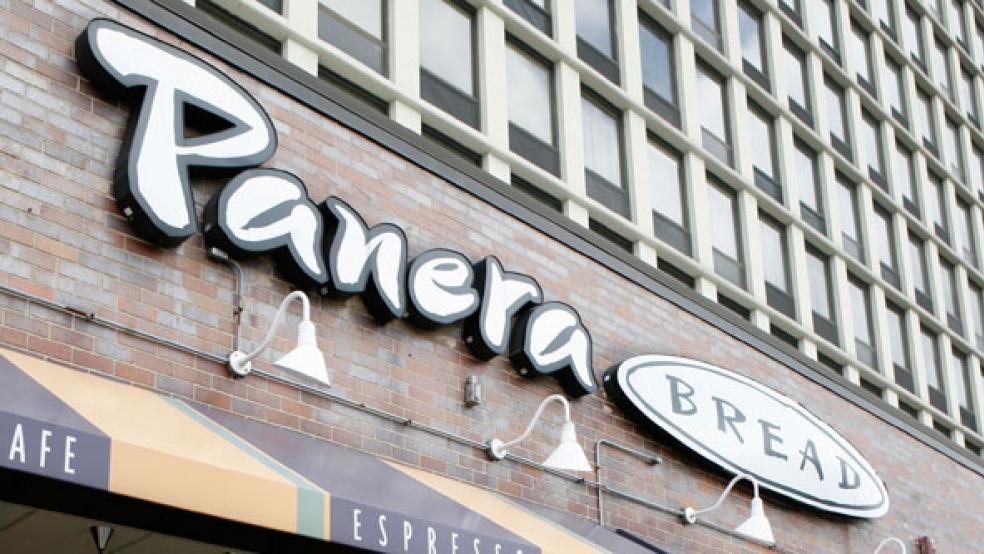Who would have thought a free lunch would have been a tricky sell? Panera Bread last week said it had withdrawn its latest pay-what-you-can meal program while it determines how to sustain the interest of both donors and diners in need. Its pay-what-you-like turkey chili came off the menu in the 48 St. Louis locations where the chain was testing the program, which let customers pay more or less than the $5.89 price for the meal.

"We're excited about what we learned, and we hope to bring it back in the future," Kate Antonacci, the director of societal impact initiatives for Panera, told CNBC.
Over the three months of the test, Panera served 15,000 of the high-fiber, high-protein chilis at an average of 75 percent of the full price, Antonacci said. It was the third phase of the testing, which the company also tried on a smaller scale in Dallas earlier this year.
RELATED: THE 9 MOST EXPENISVE JUNK FOODS
One major lesson with this round was that Panera served a lot of chili and received a lot of donations during the first few weeks of the program, but after the initial wave of publicity, all the enthusiasm and activity evaporated. "Hopefully we'll bring it back in early 2014—we're not totally sure yet," Antonacci said. The next phase probably will involve four-to-six week campaigns that will encourage both donors and diners to talk about hunger and order the meal.
The turkey chili, served in a bread bowl with an apple on the side, was a new Panera product developed specifically for this program, called the Meal of Shared Responsibility. It was designed to be especially filling for someone eating just one meal a day. "It's a lot of food, that was the point," Antonacci said.
The Missouri-based chain, which has 1,700 cafés in 44 states, also operates five completely pay-what-you-can Panera Cares nonprofit cafés as a way to feed those in need, as well as to increase community awareness about poverty and hunger. The Panera Cares locations—in Chicago; Boston; Portland, Ore.; Dearborn, Mich.; and Clayton, Mo.—will continue to operate unchanged.
PEOPLE EATING OUT MORE?
High-end restaurant chains have been outperforming the broader market this year, reports CNBC's Courtney Reagan. Bob Derrington of Northcoast Research explains why he has a neutral rating on Darden and Cheesecake Factory. What is new is Panera's attempt to perfect a single pay-what-you like item at some of its regular cafés, many of which are located in suburban areas with less poverty, or where people who are hungry might not think to walk into a Panera looking for a bargain, Antonacci said.
The company's efforts are aimed at offering a dignified response to addressing hunger in the United States, where one in six people go hungry regularly, according to Feeding America. Panera may be the biggest restaurant chain to give the pay-what-you-wish concept a try, but it certainly isn't the first.
"It definitely is a process," said Denise Cerreta, who ran a pay-what-you-like community café in Salt Lake City from 2003 to 2012. She now helms the nonprofit One World Everybody Eats, which helps others such centers. "I totally admire [Panera founder] Ron Shaich and his team for all his effort," Cerreta said. "I think the turkey chili a is a pebble in the pond. … There are ripples that are going to come from that."
Cerreta said that a decade ago, people thought she was crazy for trying to operate a pay-what-you like café, but more people are now familiar and open to the concept. Panera's campaign helps further the process. "I think people realize that they can be micro-philanthropists just by helping their neighbor," Cerreta said. "And that's huge. It's about community and community and community."
One World Everybody Eats is working with 36 restaurants that include pay-what-you like items on their menus. In addition to helping the hungry, and educating people about food insecurity, the businesses are also likely to earn the good will of paying customers, said Mary Chapman, the director of product innovation at Technomic, a food research and consultancy firm.
"There is no doubt that some consumers use that kind of information as a basis to decide what kind of companies get their loyalty," she said.
Like other companies, Panera will continue to make charitable food and cash contributions, but many likely are watching to see if this new approach works. "There is risk," Chapman said. "You let consumers—they can come in and not pay anything, they can pay twice as much. They have to trust their own customers to do the right thing, and it sounds like in a majority of their customers, enough customers, are doing that."
This article by Amy Langfield of CNBC originally appeared at CNBC.com.
Read more at CNBC:
Charitable Giving Remains a Victim of Recession
How Much Americans Think Families Need to Get By
State of the American Dream Is Uncertain




